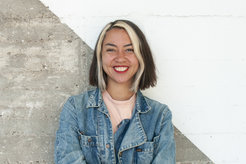"This is us" - Questions for Yayouk Willems
Our institute has over 300 employees. But that is just a number. Who are the people at our institute? What do they do and what drives them? In our "This is us" format, colleagues answer questions about their work and their motivation.

On the occasion of International Women's Day on March 8, 2023, we started the series “This is us” with 15 female scientists from our institute. We are picking up where we left off and introducing the scientist Yayouk Willems from the MPRG Biosocial. In the last episode we introduced Nour Tawil from the Lise Meitner Group for Environmental Neurocience.
One of your research topics at the MPRG Biosocial is the effect of genetic propensities combined with socially stratified environments on self- control, substance use and health. What fascinates you about this topic?
Understanding individual differences in child development has been a longstanding fascination of mine. My upbringing in a loving and supportive family at times contrasted with that of friends whose families had to cope with problems such as poverty, mental illness and violence. This observation sparked a profound interest in understanding the range of factors that matter for success later in life. During my PhD, I worked at the Netherlands Twin Register in Amsterdam where I got acquainted with investigating gene-environment interplay. I believe this is a key mechanism we should try to understand when aiming to understand how social inequality affects child and adolescent development, reproducing inequality over generations. The postdoc position in the group of Laurel Raffington is really a dream come true for me, as it allows me to investigate how the social environment intersects with biological processes to shape differential outcomes of education, health, and well-being across the lifespan.
Were you able to detect Epigenetic markers, which influence our biological age? How does that work?
Recently, DNA-methylation (DNAm) measures have quantified processes of biological aging, which describes the gradual decline in system integrity across tissues and organs that occurs with advancing chronological age. DNAm is a stable epigenetic mark that underpins the lifelong maintenance of cellular identity and a dynamic developmental process that changes with age and environmental inputs. In our recent research, we show that self-control can slow down people’s aging, as measured by these markers. Especially in older participants, those with lower self-control show faster aging. Our results show how our behavior can get “underneath our skin” and affect our health in the short and long term. In the future, we will particularly focus on children. We will investigate the effect of social inequality, and to what extent this affects biological aging already in early childhood.
Where do you get your research ideas?
I bike to work every day, which takes me around 45 min. I love this bike ride (maybe because I am Dutch?). This helps clear my mind and think of new research avenues. But most of my research ideas I get by interacting with people, with my supervisor Dr. Laurel Raffington, with my colleague Muna Aikins, but also when talking with my friends who ask me “out of the box questions” sparking new research ideas.
When did you decide to become a scientist? How did you choose this field of study?
I was actually planning to become a therapist! But I applied for a PhD grant and, when I got it, I decided to go into academia instead. I was always keen on working with adolescents. Adolescence is a period featured by increased risk-taking and social reward-seeking, coining adolescence as a period that has lasting implications for youth’s trajectories of economic security, health, and well-being into later life. I believe that a better understanding of what makes adolescents propel into different life trajectories allows us to better inform policy in the long run.
What do you appreciate about the Max Planck Community?
The atmosphere, the facilities, the people, the networks: they are all catered for us to get the most out of our research. I really feel blessed to have the opportunity to work here and contribute to science as a whole.
